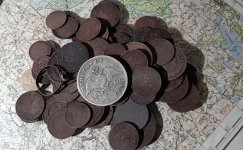OK so I went down to OBX NC and hit the beach just after a storm from the night before. I got out there on the beach excited but didn't know where to start or even try such vast sand everywhere. So any advice for the next time? I first tried the shell line that had washed up and went over it pretty well but seemed to get false readings but it was good experience on learning my detector. I hit on some very large peice of metal that had some of the road that was washed out from the last major storm. I tried up around the walk paths leading to the beach around the stairs but no luck. There are not many people out there yet so I didn't know where to check so if you were me and in the OBX about MP3 what would you do? Any thoughts would be appreciated. Thanks
Amazon Forum Fav 👍
Upvote
0




